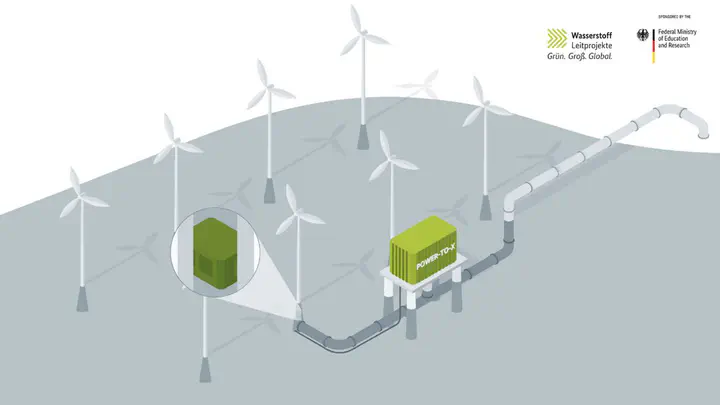PtX platform
Comprehensive process control and operations management system for an offshore PtX platform

The H2Mare project, which started in spring 2021, is one of three hydrogen lead projects funded by the German Federal Ministry of Education and Research (BMBF) to make a key contribution to implementing the national hydrogen strategy.
Within the framework of the H2Mare lead project, a completely new type of plant will find its place at sea in the future - a solution that provides an electrolyzer for the direct conversion of electric current into green hydrogen and further power-to-X modules for the production of synthetic fuels and energy carriers on an offshore platform. In this context, the IAS deals with the topics of process control system, teleoperation and digital twin in order to provide the basic building blocks for a stable, safe and economic process.
This year, in the different work packages led by the IAS: Process Control System, Teleoperation System and Digital Twin. In the first work package, the tender for the subcontracting of a higher-level process control system for the trial platform was published. This test platform is to be used to gather initial operating experience in the sense of the hardware-in-the-loop approach in order to enable the design of the future research platform on this basis. The second work package addressed the collection of requirements for the teleoperation system, which serves as a link between the platform, the control room and the digital twin. The focus of the work package on the digital twin is on the provision of a digital software infrastructure to enable, among other things, the simulative investigation of the process windows and their interaction with the process control system. Within the framework of the project, a first publication was produced [atp contribution], in which, in addition to the added values and challenges of a self-sufficient island system with the digital twin and the system for optimal operation management, the first conceptual results are detailed.
Intelligent assistance systems offer the possibility for a future-oriented support of the aging population. For this purpose, new technological approaches as well as approaches of the Internet of Things are applied to embed them in everyday life by connecting personal everyday devices. One use case for this is assistance with taking medication, which has been worked on by the IAS and in cooperation with the Institute for Construction Technology and Technical Design (IKTD) and the company Compware Medical as part of the research project “Tantum” funded by the ZIM.
The aim of this project was to develop an innovative and intelligent overall system that enables regular and precise medication intake. The main user group here was formed by elderly, chronically ill people.
The developed assistance system should adapt to the needs of the user and support him adaptively. The resulting solution approach took into account age appropriateness through the implemented usability design aspects of the automated system. Accordingly, a system consisting of a stationary as well as a mobile tablet dispenser was developed, which increases the flexibility of the system and the integration into everyday life. By networking both subsystems with the central cloud-based server, all medication dispensing information is stored locally but also centrally in a reliable and secure manner. The degree of automation and the multimodal user interface support and relieve especially the elderly user when filling tablets as well as when dispensing tablets. Thanks to the networked system, cases of error such as incorrect medication or delayed medication can be detected at an early stage and escalation measures such as contacting relatives or medical assistants can be taken. In addition, this system serves as a basis for determining, calculating as well as improving own medical adherence, which has so far been done in a generic and unsystematic way. The results were implemented using a prototype developed by the IAS, which will be implemented in terms of hardware and software and embedded in an age-appropriate housing design of the IKTD.